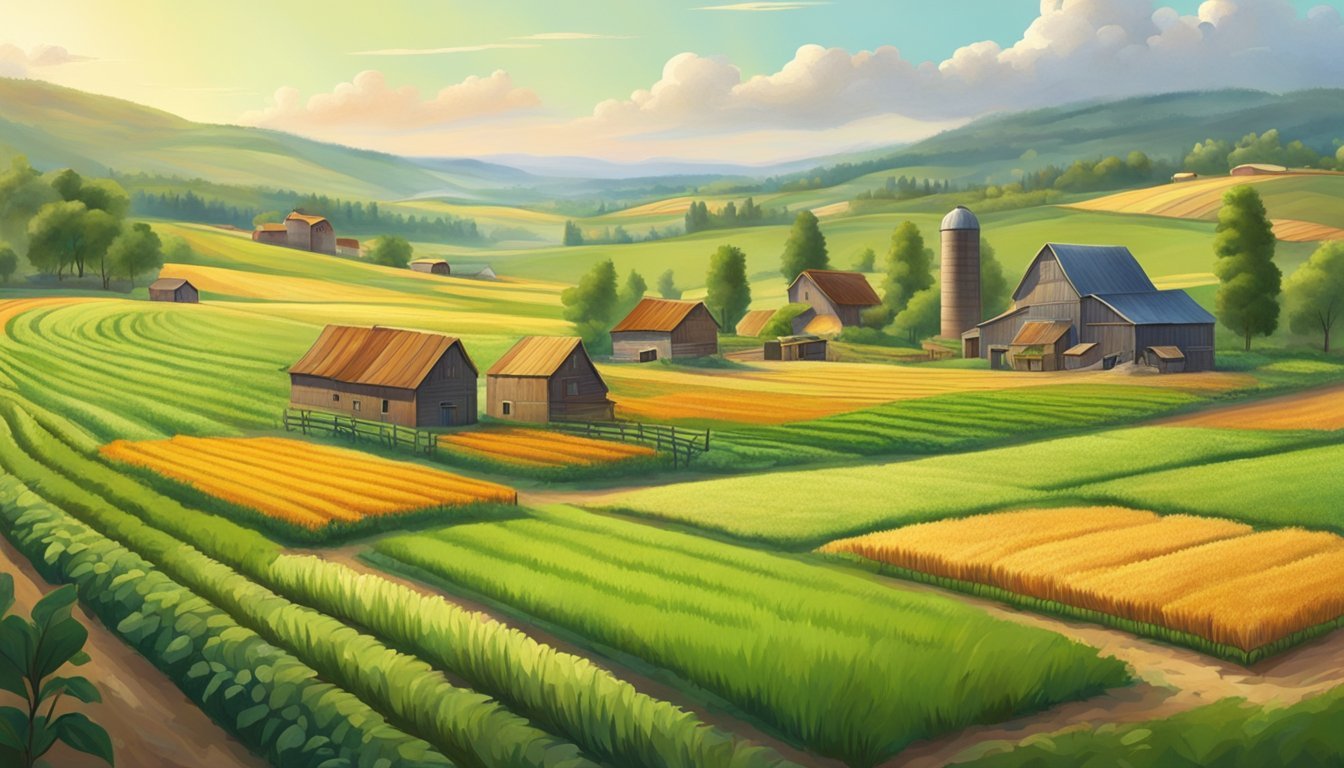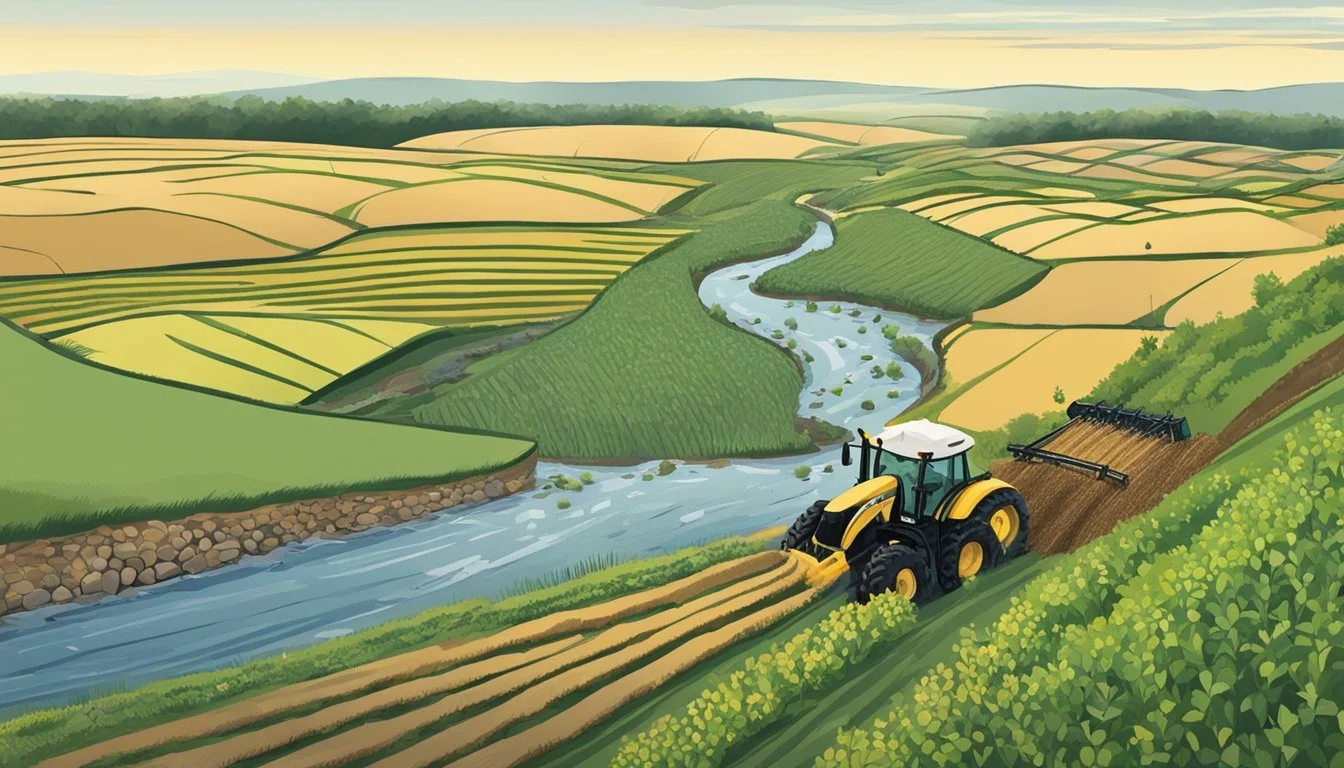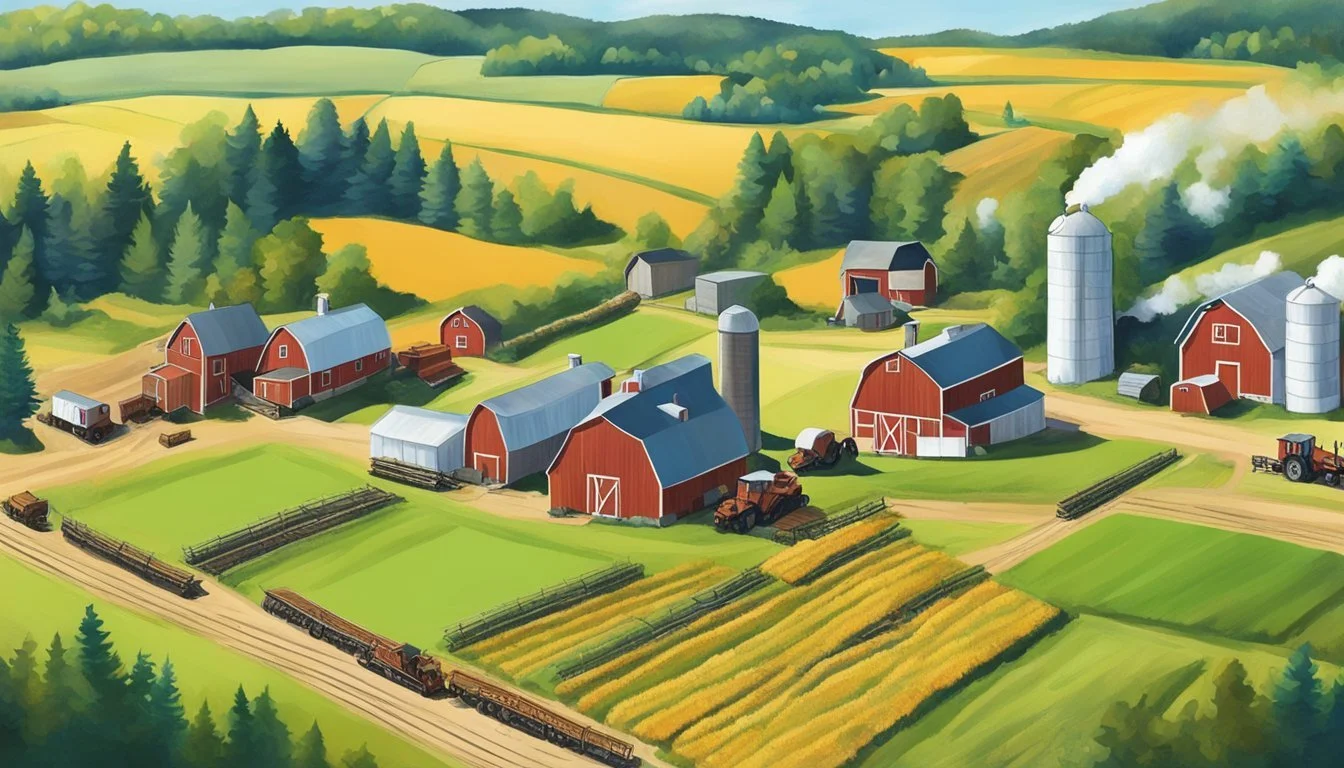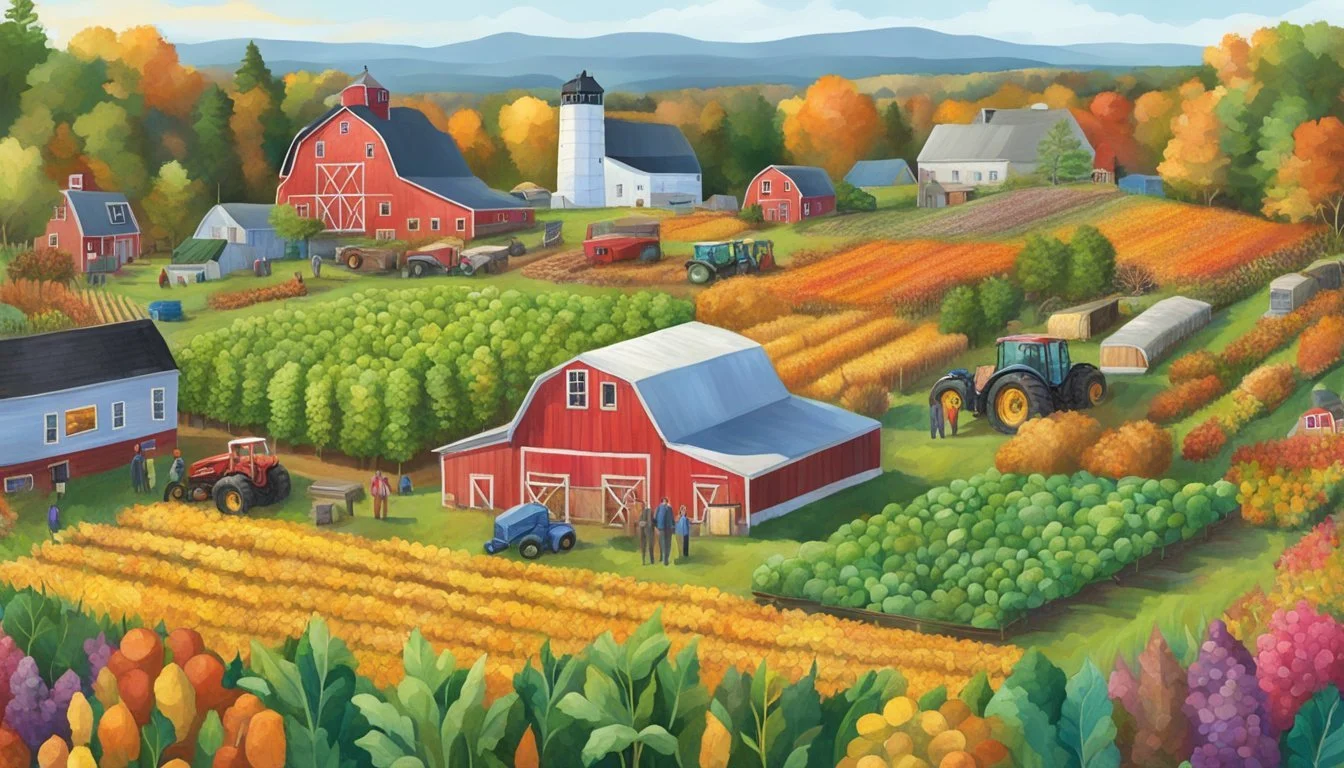Farming Communities in Maine
Sustainable Practices and Growth
Nestled in the northeastern United States, Maine's farming communities offer a unique blend of tradition and innovation. Spread across this picturesque state, agriculture forms the backbone of many rural areas, supporting local economies and providing fresh, local food. Farmers in Maine benefit from a close-knit, supportive community that has attracted newcomers keen to start their own agricultural ventures.
Maine Farmland Trust works tirelessly to protect and revitalize Maine's rural landscape by keeping agricultural lands active. This organization, founded in 1999, has been critical in ensuring that farmland remains available and productive. Through services like Maine FarmLink, first-generation farmers like Andrew and Becky Toothacker have found opportunities to purchase historic properties and reinvigorate them.
From the hills of Holden to the coastline near Limington, these farming communities are as diverse as the crops they grow. With initiatives to support both new and seasoned farmers, Maine continues to be a robust and growing hub for agricultural innovation and sustainability.
History of Farming in Maine
Farming in Maine has deep roots that stretch back to the early 19th century. During this period, agriculture played a crucial role in shaping communities and the state's economy.
In the early 1800s, Maine began to shed its frontier image, and agricultural practices became more established. This transformation saw the regulation of livestock and the spread of farming to fertile regions like the central lowlands and the Aroostook Valley.
World War II marked a significant phase for farming in Maine and the broader United States. Post-war economic and market changes led to shifts in agricultural practices and the number of operational farms. The era between 1940 and 1985 saw many farms abandoned, yet the landscape still bears the remnants of these bygone agricultural communities.
Maine's diverse farm types have included dairy farms, potato fields, and blueberry bushes. Each type contributed uniquely to the state's agricultural heritage. The local food movement in recent years has rejuvenated interest in Maine's farming traditions, highlighting the importance of sustainable and local agricultural practices.
Historical records indicate that farming was not just an occupation but a lifeline for rural communities across the state. The St. John River region, for instance, became known for its hardy crops like buckwheat and potatoes, first cultivated by Acadian families.
Despite challenges over the years, Maine's agricultural heritage remains a testament to the resilience and ingenuity of its farming communities.
Key Crops and Produce
Maine's diverse agricultural landscape produces a wide range of crops and products. Notable among these are potatoes, blueberries, and apples, alongside dairy and poultry farming, and an increasing focus on organic and specialty crops.
Potatoes and Root Vegetables
Maine is renowned for its potato production. Concentrated primarily in Aroostook County, potato farming is a cornerstone of the state's agricultural industry. The state's cool climate and rich, well-drained soil create optimal conditions for growing high-quality potatoes, including russets, reds, and whites. Potatoes from Maine are not only consumed locally but also shipped nationwide. Additionally, root vegetables such as carrots and turnips thrive here, complementing the potato harvest and diversifying the produce available to consumers.
Apples and Orchards
Apple orchards dot the Maine landscape, contributing significantly to the state's agricultural output. Varieties such as McIntosh, Cortland, and Honeycrisp are popular, prized for their flavor and versatility. Apple farming in Maine benefits from the temperate climate, which provides the necessary chill hours and conditions for producing apples with exceptional taste and texture. Beyond fresh consumption, Maine apples are used in cider production, both hard and soft, and in various culinary applications. Apple festivals and pick-your-own orchards also attract tourists, boosting local economies.
Blueberries and Berry Farms
Maine is a major producer of lowbush blueberries, often referred to as wild blueberries. These berries are smaller and sweeter than their highbush counterparts and are rich in antioxidants. The rocky, acidic soils of Maine's coastal regions are ideal for blueberry cultivation. This crop is integral to the state's agricultural exports, with significant quantities frozen, canned, or processed into products such as jams and juices. In addition to blueberries, Maine farms also cultivate strawberries and raspberries, though on a smaller scale, these berries add to the variety of local produce.
Dairy, Poultry, and Livestock
Dairy farming remains a critical part of Maine's agriculture, with numerous family-owned farms producing milk, cheese, and yogurt. The state's dairy industry benefits from pasture-based farming, which is well-suited to Maine's environment. Poultry farming is another important sector, providing chicken, eggs, and turkey. Livestock farming, including cattle and sheep, supports meat production and wool. These farms emphasize sustainable practices and contribute greatly to the rural economy by providing employment and local food sources.
Organic and Specialty Crops
There is a growing emphasis on organic and specialty crops in Maine. Organic farming practices are adopted by an increasing number of farmers, motivated by the rising consumer demand for organic produce. Specialty crops such as hops, used in craft beer production, and heirloom vegetables, are gaining popularity. Additionally, herbs and flowers, including lavender and sunflowers, are cultivated for niche markets. These crops not only diversify Maine's agricultural output but also support artisanal food producers and agritourism, reflecting the state's commitment to sustainable and innovative farming practices.
Agricultural Practices and Innovations
Maine's farming communities have embraced various agricultural practices and innovations to address sustainability, technological advancements, and organic farming. These efforts are driven by organizations like the Maine Organic Farmers and Gardeners Association (MOFGA) and focus on enhancing productivity while protecting the environment.
Organic Farming and MOFGA
Organic farming in Maine is significantly influenced by MOFGA. They provide support and resources for farmers looking to transition to organic practices. This includes training programs, knowledge sharing, and certification assistance.
MOFGA's initiatives ensure that farmers adhere to organic standards, which exclude synthetic pesticides and fertilizers. Instead, they promote natural methods like crop rotation, composting, and biological pest control. The demand for organic food continues to grow, making these practices both economically and environmentally beneficial.
Sustainable Agriculture
Sustainability is at the core of Maine’s modern agricultural practices. Farmers implement methods that conserve soil and water, reduce carbon footprints, and ensure long-term productivity. Practices include cover cropping, no-till farming, and integrated pest management.
The Maine Farmland Trust promotes sustainable agriculture by preserving farmland and supporting farming communities. They offer tools and advice on land conservation and sustainable practices. This approach not only maintains soil health but also supports local ecosystems and biodiversity.
Technological Advances in Farming
Technological innovation plays a crucial role in Maine's agricultural development. Farmers are adopting precision agriculture technologies, which include GPS-guided machinery, drones, and soil sensors. These tools aid in precise farming, reducing resource waste and increasing efficiency.
The use of data analytics helps farmers make informed decisions about crop management and harvesting schedules. Innovations also extend to greenhouses equipped with climate control systems, allowing year-round production. By integrating these technologies, Maine’s farmers can enhance productivity while minimizing environmental impact.
Land Conservation and Management
Land conservation and management are critical for sustainable farming communities in Maine. The primary strategies include the work of the Maine Farmland Trust, the use of agricultural easements, and initiatives aimed at protecting and developing farmland.
Maine Farmland Trust
Maine Farmland Trust plays a pivotal role in preserving agricultural lands. Established in 1999, it aims to protect Maine's farmland and bolster the rural landscape.
By acquiring and protecting large tracts of farmland, the Trust ensures that these lands remain available for agricultural use. They focus on sustaining farming activities and helping farmers to thrive in their communities. Collaborations with local landowners and other organizations are vital to their success.
Agricultural Easements
Agricultural easements are legal agreements that restrict the use of land to primarily agricultural purposes. These easements are crucial for preventing the land from being converted to non-agricultural uses, thereby preserving the agricultural heritage and environment of Maine.
They provide farmers with financial incentives and ensure that the land remains available for agricultural activities. Easements also maintain the ecological balance by protecting the natural resources and habitats within these farmlands, contributing to environmental conservation.
Farmland Protection and Development
Farmland protection and development programs are essential for sustaining agricultural productivity. Initiatives like those from the Maine Farmland Trust and Land for Maine's Future Program support efforts to secure farmland.
These programs help address the challenges of urbanization and industrial development that threaten farmland. They focus on providing access to resources, funding, and policies that encourage sustainable farming practices and enhance the viability of farming as a livelihood.
Tables and reports generated by these programs provide valuable data that help guide policymaking and investment in agricultural development, ensuring a balanced approach to land use and conservation.
Economic Impacts and Farm Viability
Farming communities in Maine contribute significantly to the local economy through farm businesses and provide crucial employment opportunities.
Local Economy and Farm Businesses
Maine's agricultural sector plays a vital role in sustaining the local economy. Farm businesses are integral, contributing through both direct sales and value-added products. For instance, the average sales per farm increased to $123,582 in 2022, reflecting a growth trend. Similarly, the trend in organic farming shows a 77% increase in the value of organic products sold between 2008 and 2014.
Particularly, South Paw Farm in Freedom is an example, which splits its produce equally between wholesale and farmers' markets. This diversification helps stabilize income and foster stronger local economic ties. Additionally, the protection of farmland through trusts ensures long-term viability and sustainability.
Employment Opportunities and Staffing
Employment in Maine's farming communities is dynamic, with farms providing jobs for local residents. Most farms operate with a small staff, often relying on family members or seasonal workers. For instance, although production costs increased by 24% from 2017 to 2022, farm owners emphasize the importance of maintaining a stable workforce.
Moreover, employment opportunities extend beyond the fields to include roles in farm management, marketing, and logistics. Organic farms, in particular, foster community connections and enhance employment opportunities through farmers' markets and local cooperatives. This, in turn, creates a supportive environment for farm workers and sustains the agricultural heritage of Maine.
Community Support and Resources
In Maine, farming communities thrive thanks to a robust network of support, resources, and educational opportunities that ensure sustainable agricultural practices. These initiatives are driven by local organizations, government programs, and volunteer efforts.
Local Organizations and Partnerships
Local organizations such as the Maine Farmland Trust (MFT) and the Maine Farmer Resource Network (MFRN) play a crucial role in supporting farming communities. MFT helps towns develop farm-friendly policies and shares resources to benefit local agriculture.
MFRN is a coalition of agriculture agencies that connect new and transitioning farmers to essential resources. These partnerships create a supportive framework, fostering collaborations among farmers, residents, and town officials to sustain farming.
Government Programs and USDA Support
Government programs and USDA support are vital for Maine’s agriculture. The USDA offers programs that provide financial assistance, technical guidance, and grants to farmers. These programs help with everything from crop insurance to conservation initiatives.
Additionally, state-level programs work in tandem with federal efforts, ensuring that resources are tailored to Maine’s specific needs. Local municipalities benefit too, receiving support to implement farming-friendly zoning and policies.
Education and Volunteer Opportunities
Education and volunteer opportunities enhance community engagement in Maine’s agricultural sector. Various programs, such as those run by GrowSmart Maine, offer workshops, training, and educational materials. These initiatives help farmers adopt best practices and innovative techniques.
Volunteer efforts are also significant. Community members often engage in local farming projects, participate in educational outreach, and assist in farm operations, creating a strong sense of community support. These efforts ensure that knowledge is shared and new generations are encouraged to participate in farming activities.
Environmental Challenges and Responses
Farming communities in Maine are increasingly grappling with climate change, PFAS contamination, and the adoption of renewable energy to mitigate environmental impacts.
Climate Change and Maine Farming
Farmers in Maine face increasingly unpredictable weather. Drier summers and heavier storms disrupt traditional farming practices. In response, many farmers are adopting new techniques to conserve water and improve soil health. Rotational grazing and cover cropping are effective methods that help maintain soil moisture and enhance resilience to climatic shifts.
Some farms, like Goranson Farm in Dresden, implement methods to build soil carbon, directly addressing climate issues. These practices not only improve crop yields but also contribute positively to the environment by sequestering carbon. Community involvement and knowledge-sharing play a critical role in advancing these sustainable practices.
PFAS Contamination and Testing
PFAS (per- and polyfluoroalkyl substances) contamination poses severe challenges to Maine farms. These chemicals, often referred to as "forever chemicals", persist in the environment and can cause health issues. More than 50 farms in Maine are affected, leading to significant concerns and disruptions in local agriculture.
State agricultural officials are actively conducting PFAS testing and exploring remediation strategies. While some progress has been made, many farmers, such as those in Albion, describe the contamination as an invisible disaster. Ongoing research aims to identify effective methods for mitigating PFAS in the soil and water to ensure the safety and sustainability of Maine’s farming communities.
Renewable Energy on Farms
Adopting renewable energy sources is becoming a priority for many Maine farms. Solar panels and wind turbines are increasingly common, providing sustainable power and reducing reliance on fossil fuels. This shift not only lowers operational costs but also aligns farming practices with environmental conservation efforts.
Some farms are integrating solar arrays to power their operations, while others invest in wind turbines to harness natural resources. These renewable energy solutions are crucial for reducing the carbon footprint of farming activities and promoting long-term sustainability in Maine’s agricultural sector.
Events, Training, and Collaboration
Maine's vibrant farming communities are supported by a range of events, training opportunities, and collaborative efforts. These initiatives play a crucial role in promoting agricultural knowledge, sustainable farming practices, and community engagement.
Agricultural Fairs and Exhibitions
Agricultural fairs and exhibitions in Maine provide valuable platforms for farmers to showcase their produce and livestock. Events such as the Common Ground Country Fair organized by the Maine Organic Farmers and Gardeners Association (MOFGA) draw large crowds, offering farmers opportunities for networking and education.
Exhibitions also feature live demonstrations, competitions, and educational seminars. These events celebrate the state's agricultural heritage and encourage the sharing of best practices among farmers. Attendees can learn about the latest farming techniques and innovations, helping to boost productivity and sustainability.
Training Programs and Webinars
Maine offers diverse training programs designed to support farmers at all stages of their careers. The University of Maine Cooperative Extension and MOFGA provide resources, ranging from apprenticeship programs to advanced training for established farmers. These programs cover essential topics such as soil health, crop management, and sustainable farming practices.
Webinars are regularly hosted to provide flexible learning options. For instance, GrowSmart Maine's webinars address current challenges like climate change and land use. These online sessions allow farmers to stay updated on the latest research and techniques without the need for travel, making education more accessible.
Community Engagement and Collaboration
Community engagement is vital for fostering a supportive farming environment in Maine. The Maine Farmland Trust plays a key role in this by protecting farmland and facilitating connections between farmers and local communities. Trust initiatives often include public events and forums designed to raise awareness about the importance of local agriculture.
Collaboration is further encouraged through local farming cooperatives and networks like the Maine Farmer Resource Network. These groups provide platforms for farmers to share resources, knowledge, and support. By working together, Maine's farming communities can achieve greater resilience and sustainability, ensuring a prosperous future for the state's agriculture sector.
Local Food Systems and Production
Maine's local food systems are driven by community engagement and support for local farms. These systems emphasize direct interactions between producers and consumers, innovative dining practices, and value-added products enhancing the viability of farms.
Direct-to-Consumer Sales
Maine has a robust direct-to-consumer market, with farmers' markets and Community Supported Agriculture (CSA) programs playing pivotal roles. These avenues allow consumers to purchase fresh, locally sourced products directly from the producers.
CSAs in Maine often involve a subscription model, where consumers pay upfront for a share of the harvest. This approach provides farmers with capital at the beginning of the season and ensures consistent demand for their products throughout the year.
Also, online sales platforms have increased in popularity, expanding the reach of local farms and offering convenient purchasing options. These direct sales methods significantly support farm viability by ensuring that more of the consumer's dollar goes directly to the farmer.
Farm-to-Table Initiatives
Farm-to-table initiatives in Maine aim to bridge the gap between local farms and eateries. Many restaurants and cafes proudly source their ingredients from nearby farms, creating a transparent and sustainable food system.
These establishments often highlight the origin of their ingredients on menus, fostering a deeper connection between consumers and local food production. This practice not only supports farm viability but also enriches the dining experience by offering fresh, seasonal products.
Educational programs and events, such as farm dinners and cooking classes, are also prevalent. These initiatives promote the benefits of local food and engage the community in sustainable eating practices. They play a crucial role in supporting local agriculture and educating the public about the importance of locally sourced food.
Food Processing and Value-Added Products
Food processing and value-added products are essential components of Maine's local food system. By transforming raw farm products into items like jams, cheeses, and pickles, farmers can diversify their offerings and increase revenue.
This process often involves small-scale processing facilities that focus on local food production. Grants and funding, such as those from the USDA, support these initiatives, aiming to enhance farm viability and create jobs in rural communities.
Adding value to farm products can extend their shelf life and make them more appealing to a broader market. This strategy not only helps farmers maximize their output but also meets consumer demand for unique, high-quality local food items.
By nurturing a thriving local food system, Maine continues to build a resilient and sustainable agricultural economy.
Diversity and Inclusion in Farming
Diversity and inclusion are crucial components of Maine's farming communities. Efforts to foster a more inclusive agricultural sector ensure that all farmers, including those from minority backgrounds, have equal opportunities to succeed.
Several initiatives focus on improving diversity, equity, and inclusion in agriculture. MOFGA received funding for training agricultural service providers, enhancing skills that cater to diverse farmer needs. This training addresses biases and barriers, aiming for a more accessible and user-friendly service landscape.
Incorporating diversity in farming isn't just about training programs. Farmers from different backgrounds bring varied perspectives and techniques, enriching the agricultural community. Immigrant farmers, for example, contribute their unique experiences, fostering innovation and resilience in farming practices.
Agritourism plays a role as well. Engaging in educational and recreational on-farm events, Maine's farming community reaches broader demographics. Such events promote a better understanding of agricultural diversity and create inclusive spaces for learning and interaction.
Key elements of diversity in farming:
Community Engagement: Building strong networks among diverse farming groups.
Educational Programs: Offering training that addresses the specific needs of minority farmers.
Policy Support: Advocating for policies that promote equity in agricultural opportunities.
Diversity and inclusion in farming ultimately strengthen Maine's agricultural sector, making it more vibrant and sustainable. Implementing these practices not only supports fairness but also enhances the richness and resilience of farming communities.








